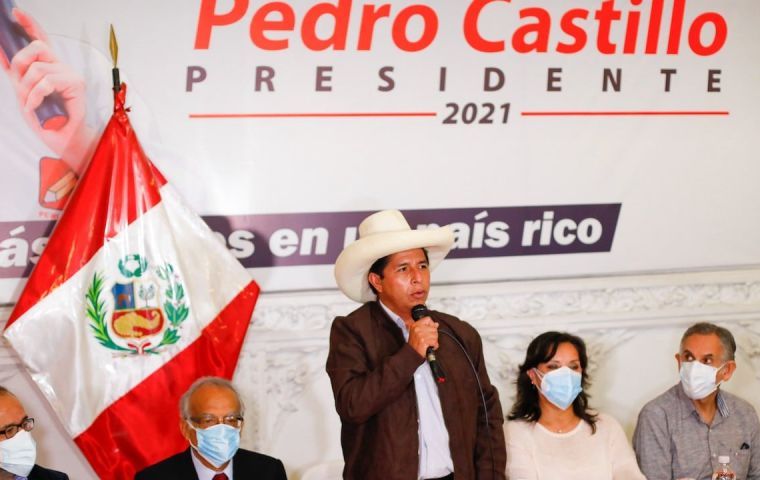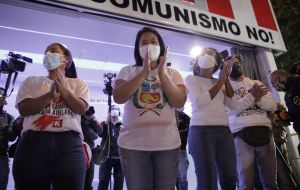MercoPress. South Atlantic News Agency
Castillo edged Fujimori by 44,000 votes as counting ends in Peruvian presidential runoff
 Indigenous Peruvians consider the annulment petitions from the female candidate of Japanese ethnicity a form of racism and discrimination
Indigenous Peruvians consider the annulment petitions from the female candidate of Japanese ethnicity a form of racism and discrimination  Fujimori's Fuerza Popular focused its appeals on polling stations in rural areas where votes for her are zero
Fujimori's Fuerza Popular focused its appeals on polling stations in rural areas where votes for her are zero Peru's electoral authorities have completed counting votes from June 6's presidential runoff, after which left-wing candidate Pedro Castillo was determined to have finished some 44,000 votes ahead of right-wing populist Keiko Fujimori.
With little below 18 million votes, counting alone is not enough to declare Castillo the winner because of Fujimori's legal contention of the outcome at some polling stations based on irregularities on which the election authorities now need to pass judgment.
Castillo got 50.125% of the votes to 49.875%, according to the National Office of Electoral Processes (ONPE). However, for Castillo to be proclaimed president-elect, the National Elections Jury (JNE) still has to decide on the annulment of votes at hundreds of stations as filed by both parties due to alleged irregularities in the respective minutes.
The end of the tight scrutiny came amid a climate of growing tension, caused by the decision of the contending parties - especially Fujimori - to enforce most of those requests, which, according to the JNE, were brought in after the legal deadline.
Given the tight difference which will in practical terms make it almost impossible to smoothly run the country for whoever ends up being declared the winner, many political forces have already pushed for the annulment of the entire elections and a call for fresh ones. But that move has been widely rejected.
Peru reached this electoral process in its worst political crisis of the century, which consumed four presidents and two legislatures so far in the current five-year term, which ends on July 28. That crisis was fueled by the coronavirus pandemic, which caused a sharp contraction in the economy.
Meanwhile, indigenous and peasant leaders and organizations are arriving in Lima in support of Castillo from all over rural Peru to make sure their will in the form of votes for Castillo is respected, as they consider the annulment petitions from the female candidate of Japanese ethnicity are a form of racism and discrimination.
Fujimori's Fuerza Popular focused its appeals on polling stations in rural areas where votes for her are zero -which they claim is not statistically credible- and may well account for all of the 44,000-vote gaps.
Politicians speculate that if a decision fails to exhaust all of its possible legal appeals by July 28, the Speaker of Parliament should take over the Executive and call for new elections, which is why Fujimori is expected to go to any lengths to achieve at least that.
In this scenario, “we have come because we want the truth, we already want the national result of the elections. We are the peasant rounds of Puña, where Professor Pedro Castillo is from. We have come from a long distance with our own ticket and our own resources to defend our vote,” said Velia Elizabeth Guerrero in Lima.
Some of the voting tables where Fujimori did not obtain any support are in the Amazon region, where citizens of the indigenous and Wampí peoples live. In a statement, the Autonomous Territorial Government of the Wampís Nation has “categorically” rejected the Popular Force's request to annul its votes. “The voting tables were legally and effectively installed in the communities of the Wampís Nation, in which we Wampís cast freely and voluntarily, and without any type of coercion, cast our vote in exercise of the right to political participation at the polls, which is recognized in the national and international legal framework,” says a document released over the weekend.
On the other hand, in a conference held by peasant and indigenous leaders in Lima, connected by the internet with Aymara from the Altiplano and apus (indigenous chiefs) of the Amazon, they declared themselves in permanent alert to enforce their votes and their communities and organizations if necessary. “This is a crude game of Fuerza Popular, it confuses the Peruvian population. With these statements by the Fujimori advisers, with racist content, they say that the mountainous area has filled out the minutes at will. They continue to treat us as second-rate people in the 21st century. We are tired of it: we have seen in all. This campaign gives contempt to indigenous peoples. If the rural vote is not respected, we will advance to a measure of struggle, for the moment we are going to wait for the result of the nullities,” said Víctor Maita, president of the National Agrarian Confederation and farmer in his native Cusco.




Top Comments
Disclaimer & comment rulesCommenting for this story is now closed.
If you have a Facebook account, become a fan and comment on our Facebook Page!